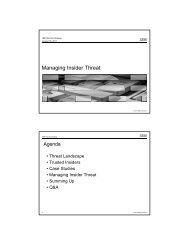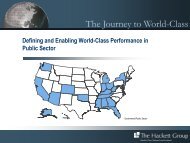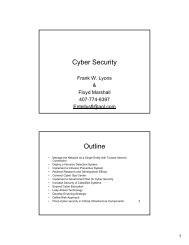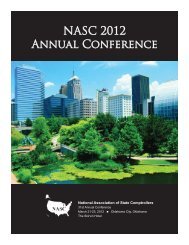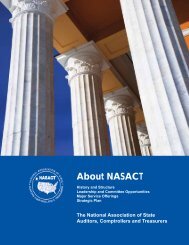Advisory Committee on Tax Exempt and Government Entities (ACT ...
Advisory Committee on Tax Exempt and Government Entities (ACT ...
Advisory Committee on Tax Exempt and Government Entities (ACT ...
Create successful ePaper yourself
Turn your PDF publications into a flip-book with our unique Google optimized e-Paper software.
The Appropriate Role Of The Internal Revenue Service With Respect To <strong>Tax</strong>-<strong>Exempt</strong> Organizati<strong>on</strong> Good Governance Issuesmembership groups, <strong>and</strong> innumerable voluntary st<strong>and</strong>ards <strong>and</strong> publicati<strong>on</strong>s fromleading organizati<strong>on</strong>s regarding n<strong>on</strong>profit governance. Because large, sophisticated<strong>and</strong> complex organizati<strong>on</strong>s are subject to regulati<strong>on</strong> <strong>and</strong>/or are accredited <strong>and</strong>, in anyevent, have numerous governance resources available to them, it is less clear what theIRS adds to the governance discussi<strong>on</strong> in their cases. C<strong>on</strong>versely, while smaller <strong>and</strong>more rural organizati<strong>on</strong>s have less governance resources available to them, there is agreater need to tread lightly because of the burdens flowing from encouragingunnecessarily extensive governance reforms, the fact that the costs of adoptingpractices that may be advisable for larger n<strong>on</strong>profits simply may not be worth thebenefits, <strong>and</strong> the reality that the costs of governance will c<strong>on</strong>sume charitable assets thatcould otherwise be devoted to the organizati<strong>on</strong>s’ programs. Finally, while disclosure<strong>and</strong> transparency, facilitated by the public availability of Forms 990 <strong>and</strong> 1023,undeniably play an influential role in encouraging appropriate n<strong>on</strong>profit governance,they have limitati<strong>on</strong>s. This secti<strong>on</strong> briefly reviews these regulati<strong>on</strong> <strong>and</strong> self-regulati<strong>on</strong>measures involving n<strong>on</strong>profit governance outside of the IRS.B. StatesWhether formed as n<strong>on</strong>profit corporati<strong>on</strong>s or charitable trusts, charities are creatures ofstate law. The laws under which they are formed <strong>and</strong> the laws c<strong>on</strong>trolling their structure<strong>and</strong> finances are state laws, <strong>and</strong> their internal affairs remain subject to state laws evenwhen they operate entirely in other geographical jurisdicti<strong>on</strong>s. 47 While not all statesdistinguish the formati<strong>on</strong> <strong>and</strong> operati<strong>on</strong> of n<strong>on</strong>profit <strong>and</strong> business corporati<strong>on</strong>s byseparate statutory schemes, 48 every state accords to the attorney general the authorityto correct abuses by charitable fiduciaries <strong>and</strong> to bring them to account in the courts. 49As a mechanism to protect charitable assets, <strong>and</strong> flowing from the formative authorityfound in state law, states n<strong>on</strong>profit laws speak with increasing specificity to governancepractices. 5047Under l<strong>on</strong>g-st<strong>and</strong>ing, although sometimes criticized, c<strong>on</strong>flict-of-laws principles for business corporati<strong>on</strong>s, the “internal affairsdoctrine” holds that the law of the state of incorporati<strong>on</strong> applies to regulate the intra-corporate matters of a foreign corporati<strong>on</strong>authorized to transact business in the forum state. However, a few states are particularly c<strong>on</strong>cerned about the “pseudo-foreigncorporati<strong>on</strong>”—the entity whose <strong>on</strong>ly tie to the state of incorporati<strong>on</strong> is incorporati<strong>on</strong> itself. California <strong>and</strong> New York, in particular,have adopted statutes applying much of their domestic corporate law to foreign corporati<strong>on</strong>s operating in-state that meet a thresholdtest. For a discussi<strong>on</strong> of the internal affairs doctrine in the c<strong>on</strong>text of n<strong>on</strong>profit corporati<strong>on</strong>s, see, e.g., American Center forEducati<strong>on</strong>, Inc. v. Cavnar, 145 Cal. Rptr. 736, 742 (Cal. App. 1978); Nati<strong>on</strong>al Associati<strong>on</strong> for the Advancement of Colored People v.Golding, 679 A.2d 554, 559 (Md. 1996).48See, e.g., Delaware General Corporati<strong>on</strong>s Law § 101.49The authority of the state attorneys general typically is very broad. See, e.g., In re Milt<strong>on</strong> Hershey Sch. Trust, 807 A.2d 324, 328(Pa. Commw. Ct. 2002); In re the Charles M. Bair Family Trust, 208 MT 144 (April 29, 2008). While st<strong>and</strong>ing to enforce fiduciaryduties has l<strong>on</strong>g been limited to the state attorney general <strong>and</strong> insiders with sufficient stake in the n<strong>on</strong>profit’s governance, such asdirectors, officers, <strong>and</strong> members of the corporati<strong>on</strong>, see, e.g., Carl J. Herzog Foundati<strong>on</strong>, Inc. v. University of Bridgeport, 699 A.2d995, 998 (C<strong>on</strong>n. 1997), the doctrine of limited st<strong>and</strong>ing has occasi<strong>on</strong>ally been relaxed to permit others to enforce these obligati<strong>on</strong>s,particularly in resp<strong>on</strong>se to perceived inacti<strong>on</strong> by the state attorney general, see, e.g., Smithers v. St. Luke’s-Roosevelt HospitalCenter, 281 A.D. 2d 127 (App. Div. 1 st Dep. 2001). See generally, Evelyn Brody, From the Dead H<strong>and</strong> to the Living Dead: TheC<strong>on</strong>undrum of Charitable D<strong>on</strong>or St<strong>and</strong>ing, 41 GA. L. REV. 1183 (2007).50California has the most detailed state laws requiring particular governance practices, specifying am<strong>on</strong>g other things thecompositi<strong>on</strong> of the audit committee for those corporate-form charities required by state law to have audited financial statements(Cal. Gov. Code Secti<strong>on</strong> 12586(e)(2)); the procedure by which the governing body of a charity, regardless of form, must review thecompensati<strong>on</strong> of certain corporate officers (Cal. Gov. Code Secti<strong>on</strong> 12586(g)); <strong>and</strong> the maximum percentage of a n<strong>on</strong>profit publicbenefit corporati<strong>on</strong>’s board that may c<strong>on</strong>sist of pers<strong>on</strong>s who are compensated by the charity or family members of those whom thecharity compensates (Cal. Corp. Code Secti<strong>on</strong> 5227).ADVISORY COMMITTEE ON TAX EXEMPT AND GOVERNMENT ENTITIES (<strong>ACT</strong>) June 11, 2008 18






